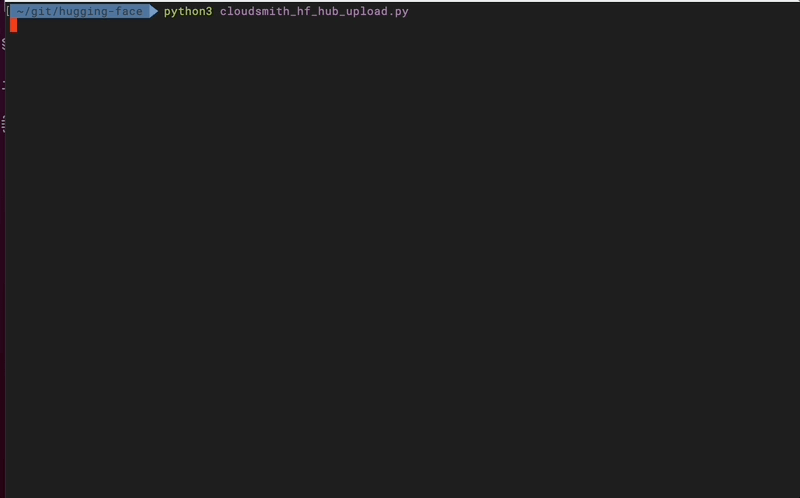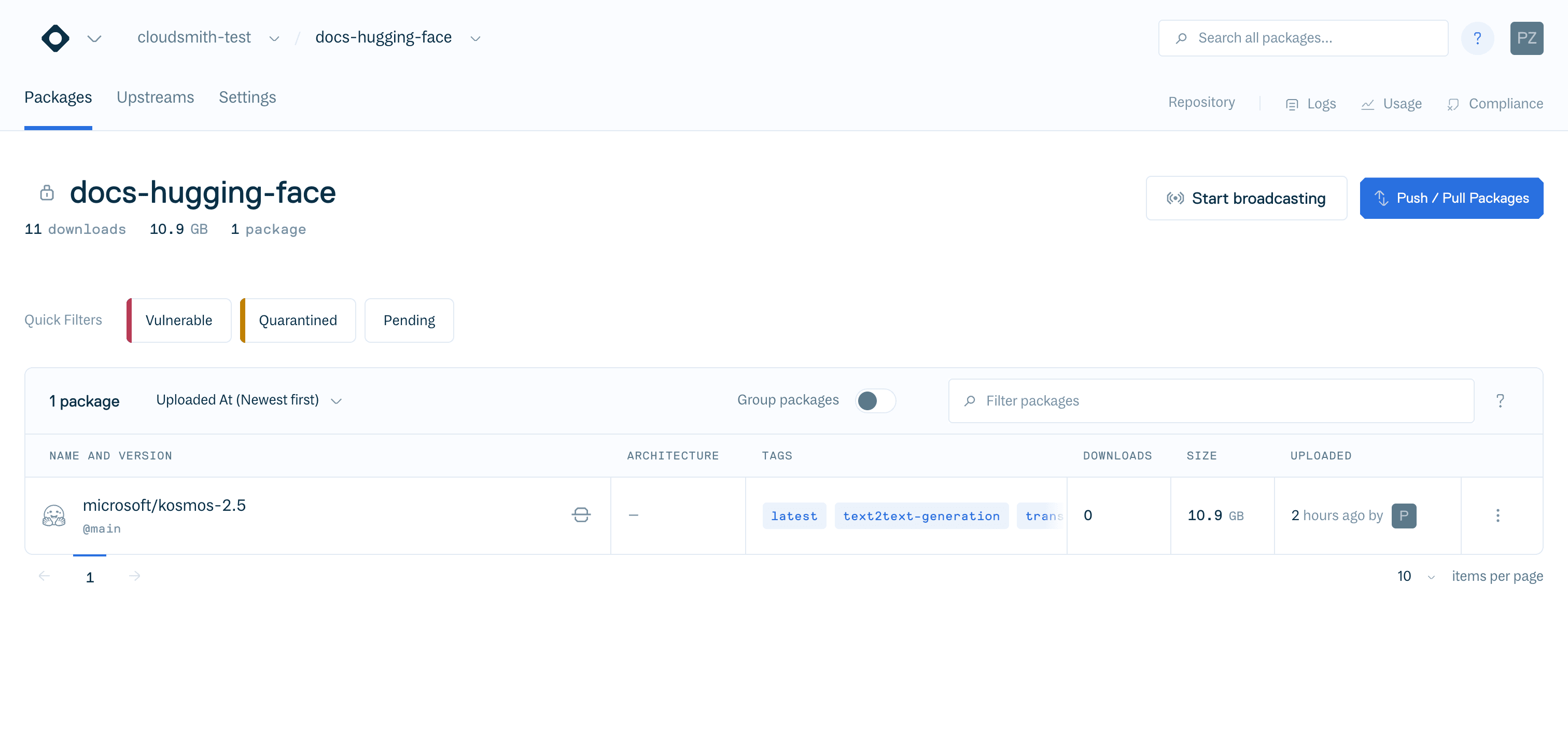Supported Formats
Hugging Face Repository
Hugging Face is an open-source platform and ecosystem for building, sharing, and deploying machine learning models, especially in the field of natural language processing (NLP) and generative AI.
Repository Types
The Hugging Face Hub has three different types of repositories:
- Model Repositories: This are used to store and distribute machine learning models, including weights, configs, tokenizer files, and model cards. They are commonly used with the
transformerslibrary. - Dataset Repositories: These are used to store datasets, scripts for loading them, and metadata. They are commonly used with the
datasetslibrary. - Space Repositories: These are used to host interactive apps, usually built with Gradio or Streamlit. They are like web demos for models or data.
Note
Spaces are not supported in Cloudsmith Hugging Face repositories.
Models and Datasets are supported and identified in the <hf_repo_type> field as models and datasets. Cloudsmith supports the main huggingface_hub python library to work with models and datasets.
For more information on Hugging Face, see:
- Hugging Face: The official website for the company and its ecosystem.
- Hugging Face Hub: The official public platform for models, datasets, and demo apps.
Storage Deduplication
Cloudsmith's Hugging Face repositories benefit from native Hugging Face file storage deduplication technology. This means that if you upload the same model or dataset multiple times (even across different repositories), Cloudsmith will only store a single copy of the data, saving you storage space and associated artifact data cost across all repositories within a workspace.
Differences from Hugging Face
Here you can see a general overview of the main naming equivalences:
| Hugging Face Term | Cloudsmith Term |
|---|---|
| Repository | Package |
| Commit / Revision | Version |
| Tag | Package Tag |
Keet reading to learn more about them.
Repository as a Package
In Cloudsmith, a Hugging Face repository is treated as a single package. This creates a simple and direct one-to-one relationship, so a package name in your Cloudsmith repository will be identical to the Hugging Face repository name, including its namespace. For example, a Hugging Face repository named workspace/sentiment-analyzer will correspond to a Cloudsmith package named workspace/sentiment-analyzer.
Commits and versions
In the Hugging Face ecosystem, a commit represents a complete snapshot of a repository at a specific point in time. This concept is fundamental to achieving reproducibility in your AI/ML builds, as each commit provides a precise, traceable record of your model, dataset, or space.
To align with this structure, Cloudsmith maps Hugging Face repositories and their commits directly to packages and versions within Cloudsmith:
-
Hugging Face Repository as a Package: the name of a Hugging Face repository (e.g., org-name/model-name) corresponds directly to the package name in Cloudsmith. You don't need to create a separate object to represent the repository itself, or create multiple repositories within Cloudsmith.
-
Commit as a package version: each unique commit pushed to the Hugging Face repository becomes a new, distinct version of that package in Cloudsmith. The version string is typically the commit hash (e.g.,
e243b1b).
This approach creates an intuitive mapping: commit-version. Each of your Hugging Face repositories is treated as a package in Cloudsmith, with the package name matching the repository name (e.g., workspace/my-awesome-model).
A new version of the package is created for every commit you push. The version is identified by the commit hash. The initial push of a commit will create both the package and its first version simultaneously. For instance, pushing a commit with the hash a1b2c3d creates the version a1b2c3d within the workspace/my-awesome-model package. This ensures that every change is versioned and fully reproducible, and guarantees a similar workflow within Cloudsmith to the ones you are used to.
Tags
In Hugging Face, a tag is a user-friendly alias to a specific commit (version). Instead of using a long commit hash like e243b1b, you can use a human-readable tag like v1.0 or latest to refer to that same snapshot. At Cloudsmith:
- Uniqueness: just as tags are unique within a Hugging Face repository, Cloudsmith tags are unique per package
- Flexibility: unlimited number of tags pointing to a single version (commit). For example, the tags latest, v2.1, and stable can all point to the same commit hash.
This mapping allows you to request a package version using a simple tag, similarly to what you can do with Docker. For instance, you can fetch the files associated with the main branch by requesting the package version tagged as main, and Cloudsmith will resolve it to the correct underlying commit automatically.
Note
Hugging Face tags included in the model card (i.e. in the README metadata), are automatically parsed and added to the Cloudsmith artifact during the sync process.
Additionally, tags can be created and managed via the UI/CLI.
In the following examples:
| Identifier | Description |
|---|---|
WORKSPACE | Your Cloudsmith workspace name. |
REGISTRY | Your Cloudsmith Repository name (also called "slug"). |
TOKEN | Your Cloudsmith API Token |
API-KEY | Your Cloudsmith API Key. |
repo_id | The name of your HF artifact. |
repo_type | The type of artifact: model or dataset. |
TAG | A tag for your HF artifact. |
Uploading Packages
You can easily upload your models and datasets to Cloudsmith using the tools you already know. Cloudsmith supports uploads via the huggingface_hub Python library, which is the underlying engine for popular libraries like transformers and datasets.
Using huggingface_hub
Before starting, update the HF_ENDPOINT and HF_TOKEN variables with your Cloudsmith endpoint and API Token.
This is the most direct method. You can upload any folder containing your model or dataset files using the upload_folder function.
from huggingface_hub import HfApi
HF_ENDPOINT = "https://huggingface.cloudsmith.io/WORKSPACE/REPOSITORY"
HF_TOKEN = "CSA_API_TOKEN"
MODEL_NAME = "microsoft/kosmos-2.5"
LOCAL_DIR = "/path/to/your/model_files/snapshot/id"
api = HfApi(endpoint=HF_ENDPOINT, token=HF_TOKEN)
api.upload_folder(
folder_path=LOCAL_DIR,
repo_id=MODEL_NAME,
repo_type="model",
token=HF_TOKEN,
commit_message="Initial upload via CS",
revision="main"
)Execute the script, and you will see the upload progress in your terminal:

You will see the package appear in your Cloudsmith repository shortly after the upload completes:

Downloading Packages
Cloudsmith supports the huggingface_hub Python library to upload packages using its snapshot_download function.
Using huggingface_hub
Before starting, set the HF_ENDPOINT and HF_TOKEN variables with your Cloudsmith endpoint and API Token.
This is the most direct way to download all the files for a specific package version (commit) from your Cloudsmith repository.
from huggingface_hub import HfApi
HF_ENDPOINT = "https://huggingface.cloudsmith.io/WORKSPACE/REPOSITORY"
HF_TOKEN = "CSA_API_TOKEN"
MODEL_NAME = "microsoft/kosmos-2.5"
api = HfApi(
endpoint=HF_ENDPOINT,
token=HF_TOKEN,
)
local_dir = api.snapshot_download(
repo_id=MODEL_NAME, repo_type="model", revision="main"
)Upstream Proxying / Caching
SupportedYou can configure your Cloudsmith repository to act as a proxy for the public Hugging Face Hub. This allows you to cache models and datasets from the public Hub into your private Cloudsmith repository for faster, more reliable access, at the same time as you manage your own private models and datasets.